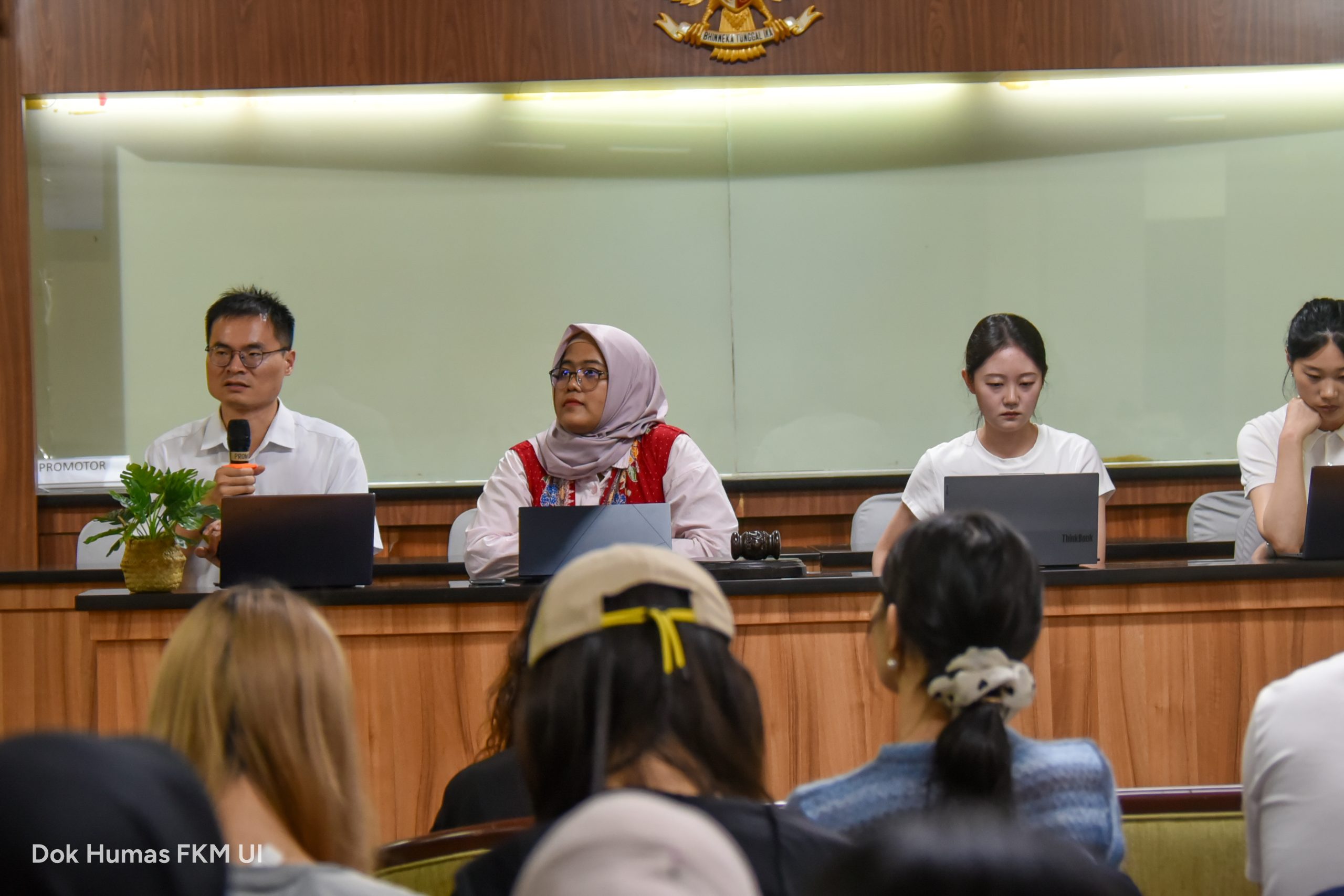Depok, August 25, 2025 – The Faculty of Public Health, Universitas Indonesia (FPH UI), continues to demonstrate its commitment to expanding international academic networks and enriching the perspectives of its academic community by hosting a Public Lecture titled “Environmental Health: Toxicology & Data-Driven Research.” The event, held at the Doctoral Promotion Hall, Building G, FPH UI, featured academics from Hangzhou Medical College, China, and was open to both the academic community and the general public.
The public lecture presented four keynote speakers: Dr. Li Yingjun (Associate Professor and Deputy Dean, School of Public Health), Dr. Xu Huadong (Distinguished Associate Professor, Academic Deputy Dean, School of Public Health), Dr. Xu Dengfeng (Distinguished Associate Professor, Assistant Dean, School of Public Health), and Dr. Yang Ye (Lecturer, School of Public Health). In addition, two postgraduate students, Qian Jing and Zhu Zhenyu, also shared their research findings. The session was moderated by Fitri Kurniasari, S.K.M., M.K.K.K., Ph.D., lecturer at the Department of Environmental Health, FPH UI.
In his presentation, Dr. Xu Dengfeng highlighted how the use of big data opens new opportunities in environmental health research. He explained that traditional approaches, such as small-scale surveys or laboratory testing, often fall short in reflecting real-world conditions. “Environmental health research has often relied on small surveys or animal testing. While the results are important, they are limited—small sample sizes, high costs, and not always representative of human conditions,” he noted. With access to global datasets such as NHANES, the Global Burden of Disease, and Network Toxicology, researchers can now uncover hidden patterns linking environmental exposures to human health in a more holistic and accurate way.
Meanwhile, Qian Jing, a postgraduate student at Hangzhou Medical College, discussed the multidimensional influence of social, natural, and epigenetic factors on chronic diseases. She emphasized that conditions such as heart disease, stroke, cancer, diabetes, and osteoarthritis result from complex interactions among lifestyle, environmental conditions, and genetic susceptibility. Her research also revealed that social isolation and loneliness are closely linked to chronic inflammation, which triggers various illnesses, while air pollution significantly contributes to increased risks of osteoarthritis.
The next presentation, by Zhu Zhenyu, focused on findings regarding Benzophenone-3 (BP-3)—a chemical commonly found in sunscreen, cosmetics, and product coatings. His research indicated that high levels of BP-3 in the body may accelerate cartilage cell aging and joint damage, thereby increasing the risk of osteoarthritis. Although still limited to animal and cell-based studies, BP-3 warrants serious attention as a new environmental risk factor for human health.
Closing the session, the moderator underlined that the three presentations collectively reinforced the importance of interdisciplinary research in addressing modern public health challenges. Data-driven studies uncover new patterns, multidimensional approaches reveal the complex interplay of chronic disease causes, and research on everyday chemicals raises awareness of environmental threats close to human life. “Together, these insights form an important foundation for developing more comprehensive health policies and strengthening our shared commitment to protecting the health of current and future generations,” stated Fitri Kurniasari.
Furthermore, Fitri, Ph.D., expressed her appreciation for the participation of academics from Hangzhou Medical College. “The presence of these international speakers greatly enriches the perspectives of FPH UI students, lecturers, and researchers. We hope this forum will pave the way for future research collaborations that can contribute meaningfully to global health issues,” she added.
This public lecture serves as further evidence of FPH UI’s commitment to providing high-quality, internationally competitive academic forums. Through collaboration and knowledge exchange across borders, FPH UI strives to strengthen its position as a leading center for education, research, and the advancement of public health sciences in Indonesia. (wrk)

